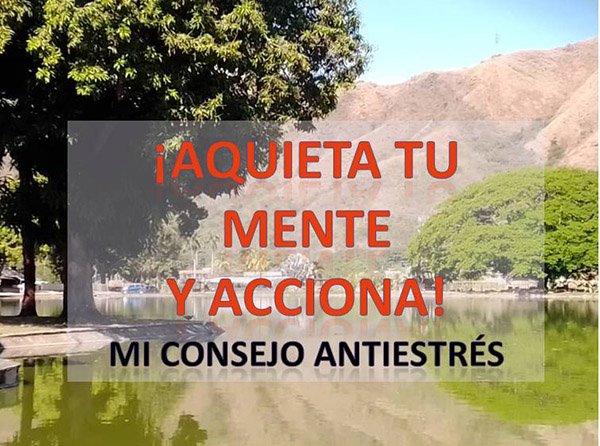
—Me estresa ver esa gente parada allí, esperando ser atendidas
—Estoy estresada porque fulano no me ha llamado
—Deja el estrés, bájale dos.
—Yo trabajo mejor bajo estrés
Son expresiones que escuchamos y tal vez digamos con frecuencia porque la palabra estrés se ha transformado en comodín que expresa estados de ánimo, emociones y sentimientos que no nos detenemos a identificarlos, sino que los metemos en el saco correspondiente, de tal manera que lo que siento y me acelera de forma negativa va para el apartado estrés, entonces en vez de decir estoy molesta, asustada, impaciente, es decir, reconocer la emoción que me embarga en ese momento, pues sencillamente digo, tal vez con mucha ligereza, estoy estresada.
Y aunque cada una de esas emociones: ira, miedo, impaciencia pueden ser síntomas de estrés, una sola de ella no define el estrés, ese trastorno que aqueja a un alto porcentaje de la población mundial y que ha sido catalogado como la enfermedad de salud mental del siglo XXI.
De entrada el estrés es considerado como una respuesta natural del organismo ante una situación de alarma, es lo que llamamos el instinto de supervivencia que emerge, por ejemplo, cuando nos encontramos en peligro, por lo que a este nivel se habla de un estrés positivo.
El asunto se va complicando cuando nos mantenemos en un constante estado de alarma y nuestro organismo se ve forzado a trabajar, sin darse tregua, en tratar de mantener un equilibrio para no colapsar y aquí es donde entramos en el mundo de la percepción y con ella al pensamiento y las emociones. Porque si bien es cierto que existen infinidades situaciones que pueden activan nuestros sensores de alarma, no menos cierto es que la manera en que las percibimos generaran mayor o menor grado de estrés.
Y de aquí la importancia de identificar la emoción o sentimiento que nos domina ante una situación dada. Cuando reconozco que siento ira e impotencia por un hecho, puedo trabajar estas emociones y pensamientos en concreto, no dejando espacio para su acumulación, previniendo el estrés crónico, ese que como un globo se va inflando hasta que revienta, pero mientras lo hace va dejando una estela de malestar que nos afecta en el ámbito físico, mental y espiritual.
El amigo @emiliorio en su columna Séptimo Día, nos invita a que compartamos nuestros mejores consejos contra el estrés y mi consejo es uno: ¡Aquieta tu mente! El estrés nace y muere en la mente.
Posiblemente, ante esta idea, argumentaras que existen situaciones externas que potencian el estrés: una situación económica donde los ingresos que percibes solo alcanzan para solventar medianamente tus requerimientos personales y familiares, una situación latente de “enfermedad física” que no sabes a donde te llevará, un problema de conducta y actitud de un hijo que no encuentras el camino para resolverla, un trabajo poco gratificante.
Cada una de estas situaciones pueden ser detonantes del estrés, sin embargo, ninguna de ellas la resuelves desde el estrés, muy por el contrario las afianzas con él, porque si algo caracteriza al estrés es la percepción de que la situación nos sobrepasa y que no tenemos los recursos físicos y emocionales para superarlas. Te doy un ejemplo, para explicarme mejor.
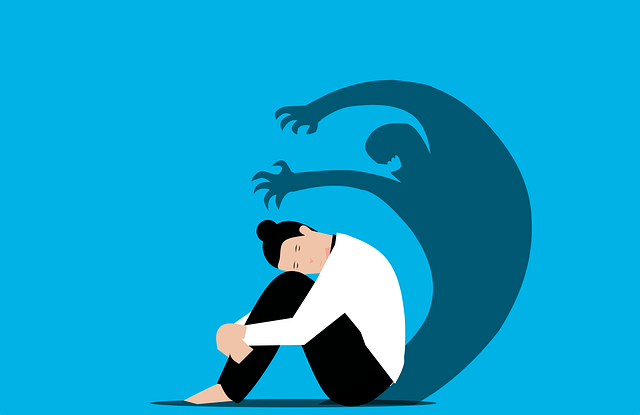
Hace más de un año descubrí en uno de mis senos una pelotica ¡horror! Comenzó el susto y el estrés, en los momentos más inesperados cruzaba el pensamiento del cáncer, creándome más aprehensión y aunque trabajaba con constancia mis pensamientos positivos diciéndome que soy una mujer sana y hacía mis meditaciones guiadas de salud y luminosidad, pues la alarma seguía encendida consciente e inconscientemente. Fíjate, más de un año rumiando una situación desgastante y que de paso no la compartí con nadie, pues sabía lo que me iban a decir: tienes que ir al médico.
¿Por qué no iba al médico? Por miedo, por cobarde, por no querer afrontar y por supuesto todos estos sentimientos los tapaba con justificaciones: no tengo dinero, seguro que hacerme todos los exámenes será un dineral, no tengo tiempo, no tengo ánimos para entrar en un proceso médico. Mientras todo esto sucedía allí estaba el estrés, cada día más tensa, más aprensiva, me costaba relajarme y disfrutar mis momentos.
En enero decidí y me dije: ¡hasta aquí!, anda hacerte el chequeo y deja de rumiar penas que no tienes. En febrero comencé por hacerme un eco mamario, efectivamente el doctor encontró lo que llamó un nodo, me recomendó la mamografía y la visita al mastólogo. La mastóloga revisó, tomó muestra y al patólogo. Gracias a Dios todo bien, solo grasa.
Durante más de un año alimenté una situación que me producía estrés, ¡dime si no son ganas de fastidiarte la vida! La situación está allí y podemos pasar años alimentándola con nuestros pensamientos negativos, catastróficos, anotándonos en lo peor o podemos accionar “haciendo lo que nos corresponde y podemos hacer” para eliminar o por lo menos atenuar lo que nos genera el estrés.
El estrés es como un ser vivo: nace, crece, se multiplica y muere cuando dejamos de alimentarlo con los pensamientos y por supuesto con las acciones que nos llevan a solucionar. Con esto completo mi consejo:
¡Aquieta tu mente y acciona!

In English
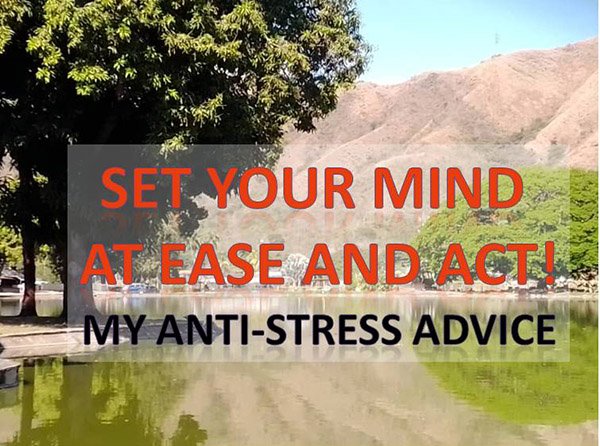
- It stresses me out to see those people standing there waiting to be served.
- I'm stressed out because so-and-so hasn't called me back
- Stop stressing, take it down two notches.
- I work better under stress
These are expressions that we hear and perhaps say frequently because the word stress has become a wild card that expresses moods, emotions and feelings that we do not stop to identify them, but we put them in the corresponding bag, so that what I feel and accelerates me in a negative way goes to the stress section, then instead of saying I am upset, scared, impatient, that is, to recognize the emotion that overwhelms me at that moment, I simply say, perhaps very lightly, I am stressed.
And although each of these emotions: anger, fear, impatience can be symptoms of stress, just one of them does not define stress, a disorder that afflicts a high percentage of the world's population and that has been catalogued as the mental health disease of the 21st century.
To begin with, stress is considered a natural response of the organism to an alarming situation; it is what we call the survival instinct that emerges, for example, when we find ourselves in danger, so at this level we speak of positive stress.
The matter becomes more complicated when we remain in a constant state of alarm and our organism is forced to work, without respite, in trying to maintain a balance so as not to collapse and this is where we enter the world of perception and with it the thought and emotions. Because although it is true that there are infinite situations that can activate our alarm sensors, it is no less true that the way we perceive them will generate a greater or lesser degree of stress.
And hence the importance of identifying the emotion or feeling that dominates us in a given situation. When I recognize that I feel anger and helplessness for an event, I can work these emotions and thoughts in particular, leaving no room for their accumulation, preventing chronic stress, that like a balloon is inflating until it bursts, but while doing so leaves a trail of discomfort that affects us physically, mentally and spiritually.
The friend @emiliorio in his column Séptimo Día, invites us to share our best tips against stress and my advice is one: Quiet your mind! Stress is born and dies in the mind.
Possibly, before this idea, you will argue that there are external situations that enhance stress: an economic situation where the income you receive is only enough to cover your personal and family requirements, a latent situation of "physical illness" that you do not know where it will take you, a problem of behavior and attitude of a child that you do not find the way to solve it, an unrewarding job.
Each of these situations can be triggers of stress, however, none of them can be solved from stress, on the contrary, you strengthen them with it, because if something characterizes stress is the perception that the situation is beyond us and that we do not have the physical and emotional resources to overcome them. Let me give you an example, to explain myself better.

More than a year ago I discovered in one of my breasts a small hair -horror! The fright and stress began, in the most unexpected moments the thought of cancer crossed my mind, creating more apprehension and although I worked with constancy my positive thoughts telling myself that I am a healthy woman and I did my guided meditations of health and brightness, the alarm was still on consciously and unconsciously. Look, for more than a year I was ruminating on a situation that was exhausting and that I didn't share with anyone, because I knew what they were going to tell me: you have to go to the doctor.
Why didn't I go to the doctor? For fear, for being a coward, for not wanting to face it and of course I covered all these feelings with justifications: I don't have money, I'm sure that having all the tests done will be a lot of money, I don't have time, I don't feel like going through a medical process. While all this was happening there was the stress, every day more tense, more apprehensive, it was difficult for me to relax and enjoy my moments.
In January I decided and said to myself: "this is it, go and have a check-up and stop ruminating on the pain you don't have. In February I started by having a breast ultrasound, the doctor found what he called a node, he recommended a mammogram and a visit to the mastectologist. The mastologist checked, took a sample and sent me to the pathologist. Thank God everything was fine, just fat.
For more than a year I fed a situation that caused me stress, tell me if it is not a desire to screw up your life! The situation is there and we can spend years feeding it with our negative, catastrophic thoughts, writing down the worst or we can take action by "doing what is ours and what we can do" to eliminate or at least attenuate what generates stress.
Stress is like a living thing: it is born, grows, multiplies and dies when we stop feeding it with thoughts and of course with the actions that lead us to solve. With this I complete my advice:
Quiet your mind and take action!

Translated with www.DeepL.com/Translator (free version)
Fuente de imagen. Imagen de Mohamed Hassan en Pixabay
Foto portada: Archivo personal.



MIS REDES SOCIALES

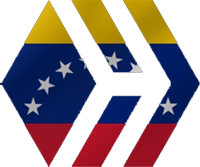
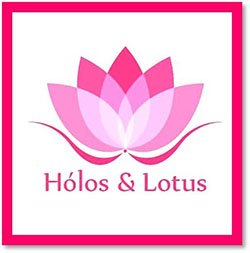


Be Entrepreneur








